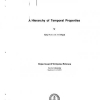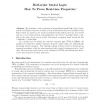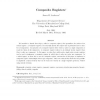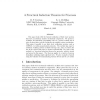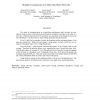PODC
1990
ACM
15 years 6 months ago
1990
ACM
146
click to vote
PODC
1990
ACM
15 years 6 months ago
1990
ACM
Abstract. We introduce a novel extension of propositional modal logic that is interpreted over Kripke structures in which a value is associated with every possible world. These val...
121
click to vote
PODC
1990
ACM
15 years 6 months ago
1990
ACM
Three self-stabilizing protocols for distributed systems in the shared memory model are presented. The first protocol is a mutual exclusion protocol for tree structured systems. T...
111
click to vote
PODC
1990
ACM
15 years 6 months ago
1990
ACM
We introduce a shared data object, called a composite register, that generalizes the notion of an atomic register. A composite register is an array-like shared data object that is...
112
click to vote
PODC
1990
ACM
15 years 6 months ago
1990
ACM
Emulators that translate algorithms from the shared-memory model to two different message-passing models are presented. Both are achieved by implementing a wait-free, atomic, singl...
PODC
1989
ACM
15 years 6 months ago
1989
ACM
PODC
1989
ACM
15 years 6 months ago
1989
ACM
A deterministic message-communicating process can be characterized by a “continuous” function f which describes the relationship between the inputs and the outputs of the proc...
PODC
1989
ACM
15 years 6 months ago
1989
ACM
PODC
1989
ACM
15 years 6 months ago
1989
ACM
: What should it mean for an agent to know or believe an assertion is true with probability :99? Di erent papers FH88, FZ88, HMT88] give di erent answers, choosing to use quite di ...
144
click to vote
PODC
1989
ACM
15 years 6 months ago
1989
ACM
Two tasks of communication in a multi-hop synchronous radio network are considered: point-to-point communication and broadcast (sending a message to all nodes of a network). Effi...
